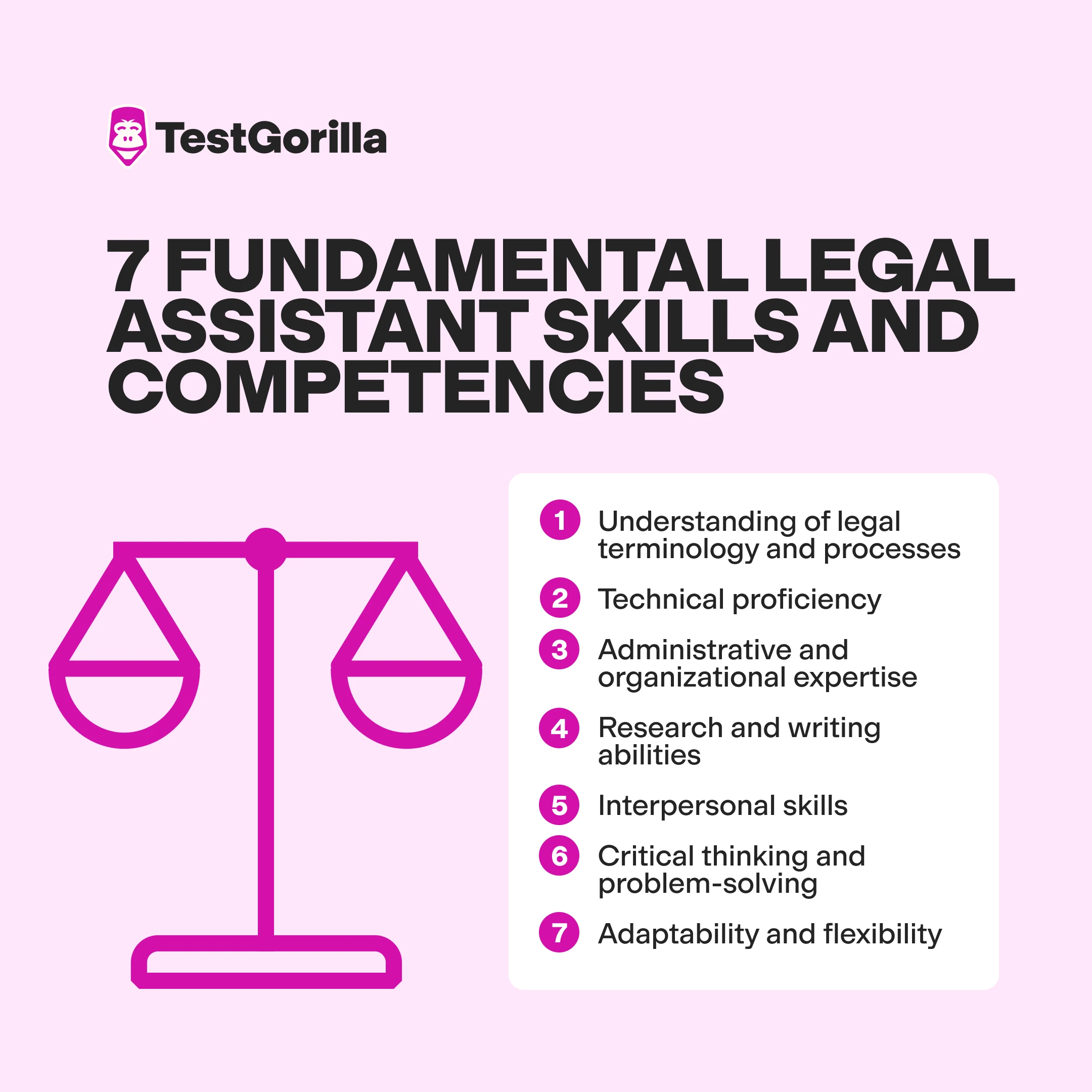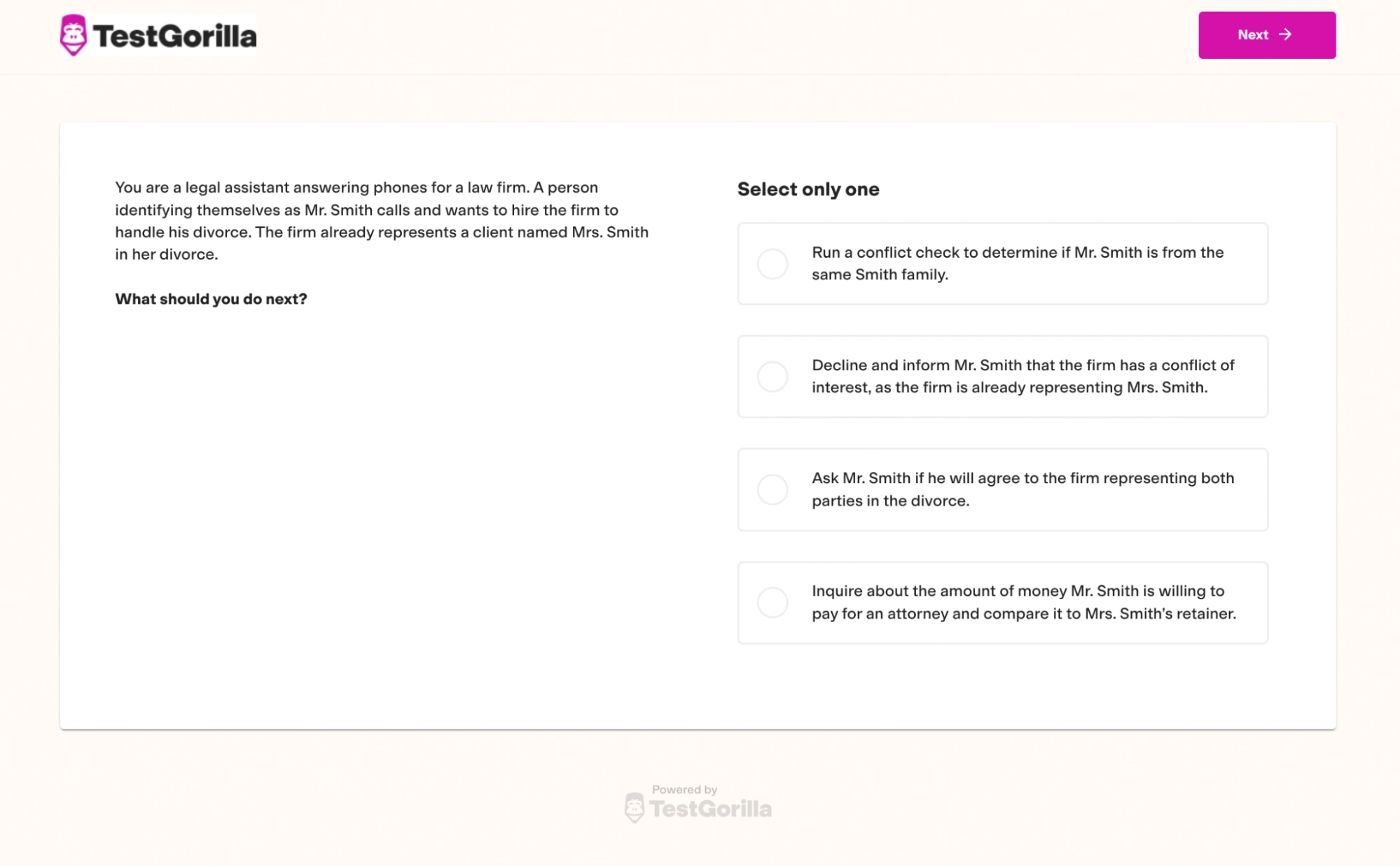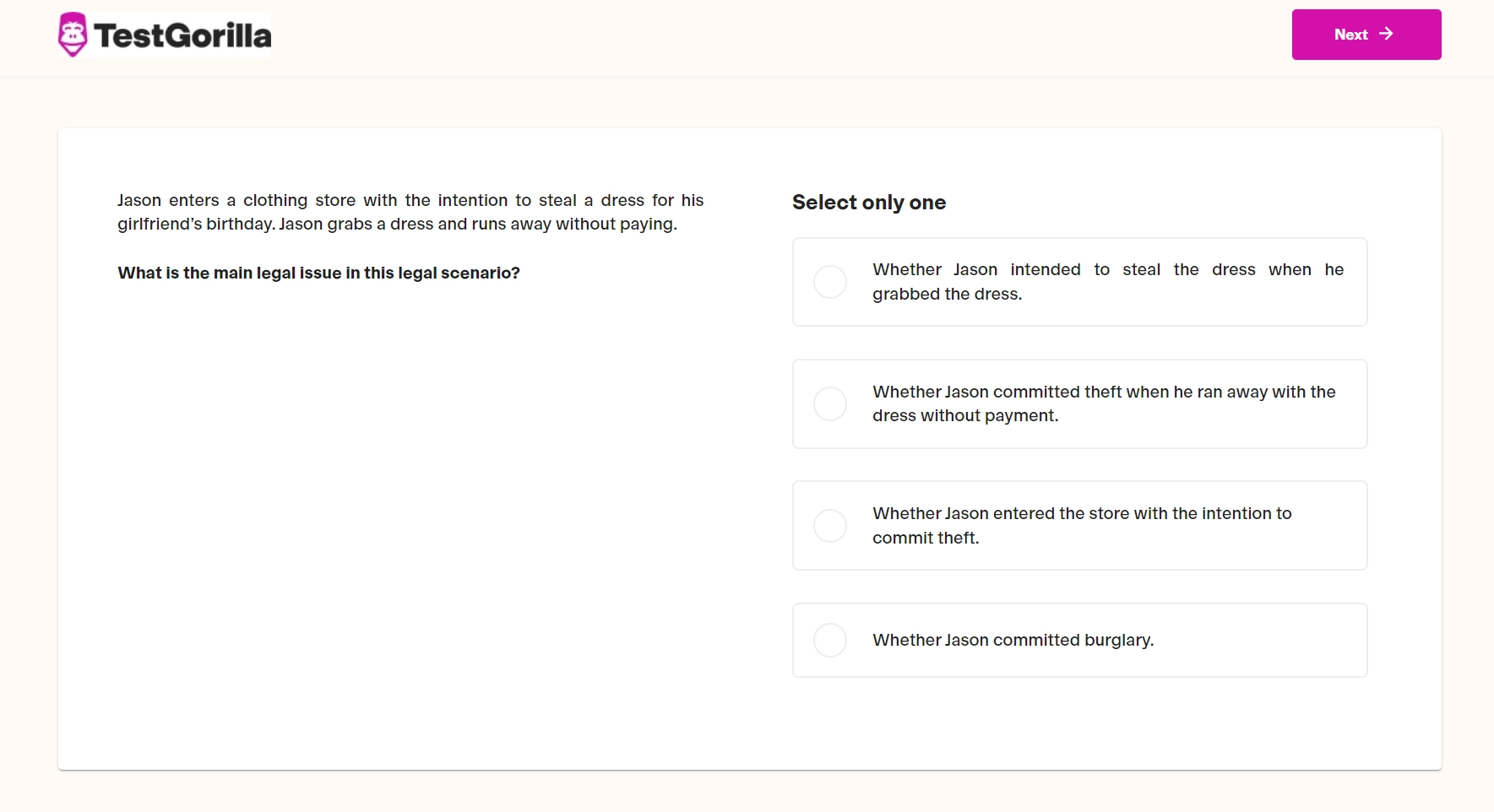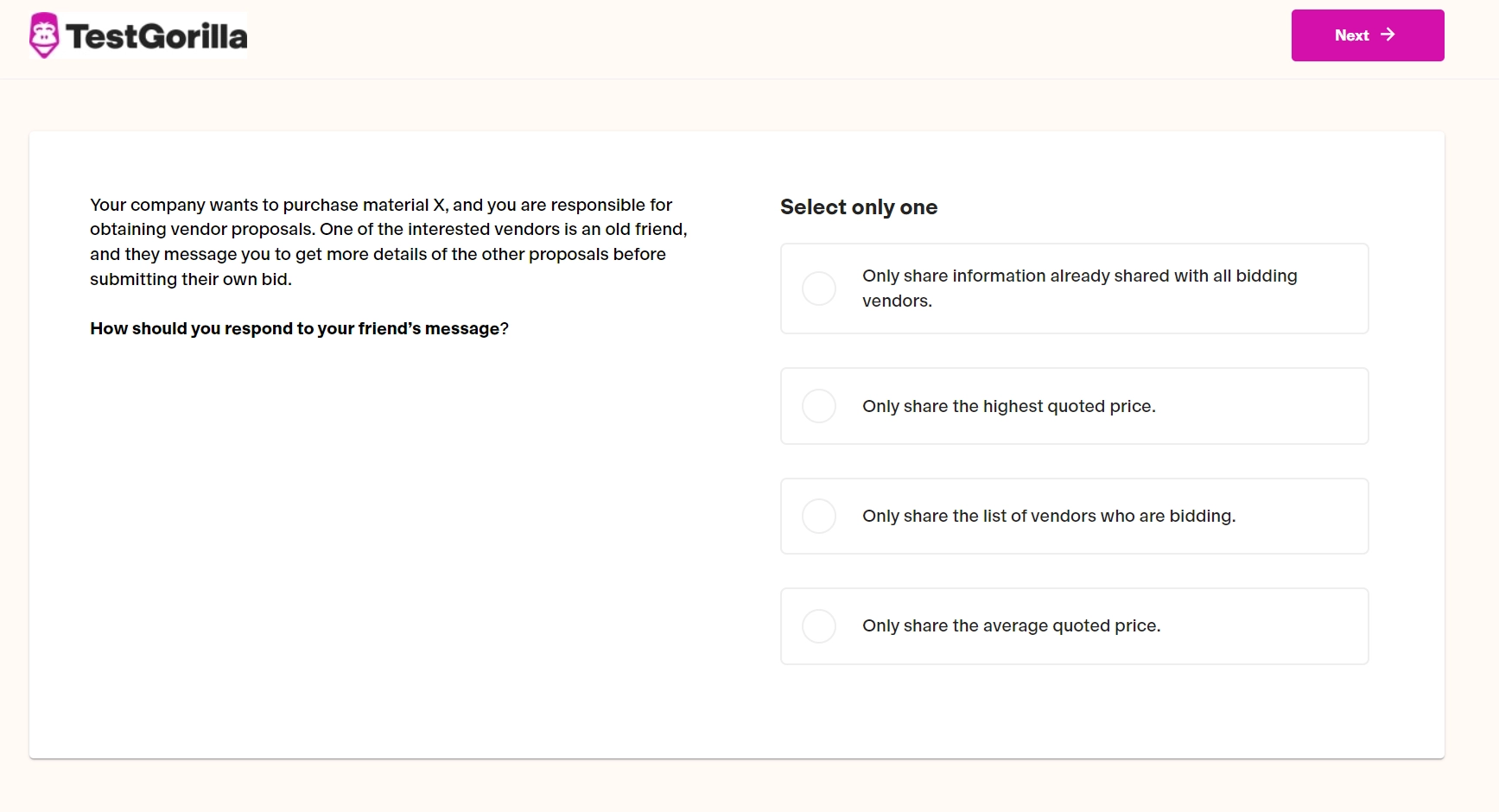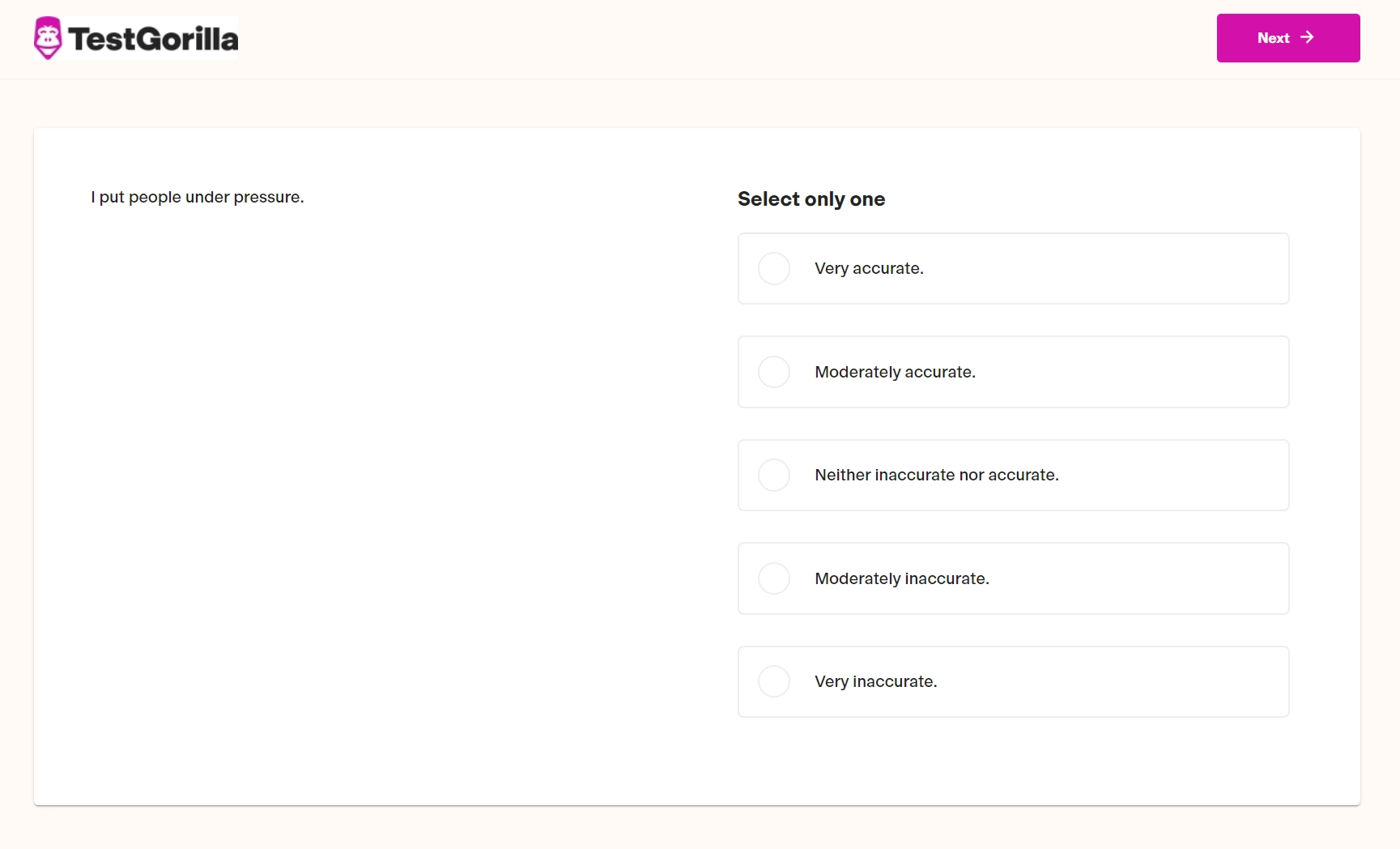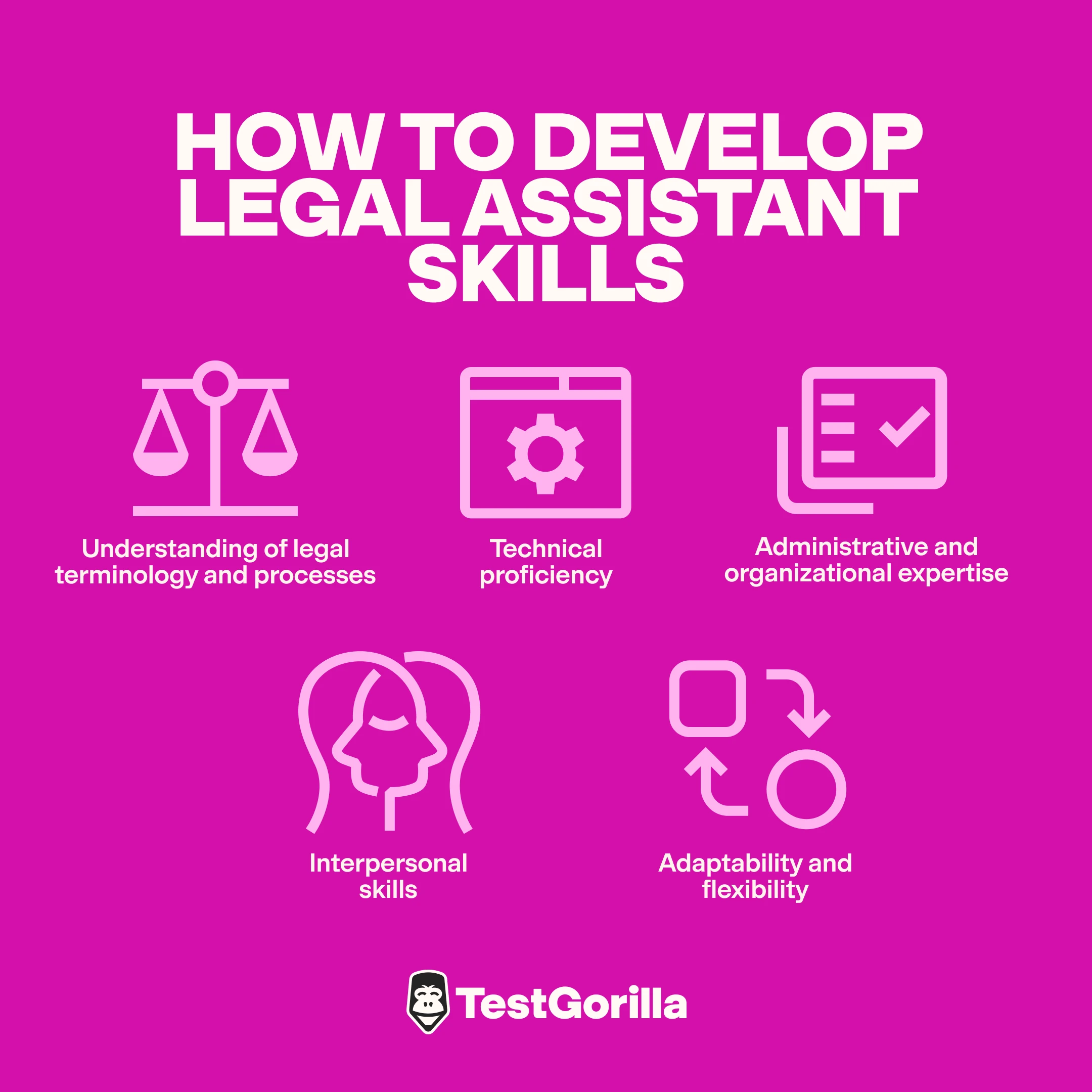Reliably assess legal assistant skills with talent assessments
Hiring a competent legal assistant is crucial for law firms and legal departments to ensure smooth operations and provide excellent support to attorneys.
However, evaluating the skills of legal assistant candidates can be challenging because a skilled legal assistant needs to combine knowledge of legal terminology and procedures with interpersonal skills and meticulous attention to detail.
So, how do you screen candidates correctly, efficiently, and cost-effectively? This guide shows you how to identify the best legal assistant skills, evaluate them with skills-based hiring, and make the right hiring decisions.
7 fundamental legal assistant skills and competencies
Legal assistants support attorneys, contribute to efficient legal operations, and provide excellent client service. With so many responsibilities, it’s important to recruit a legal assistant with the right skills and traits for the job.
Let’s discuss the seven most important skills to include in a legal assistant job description and validate with pre-employment testing:
1. Understanding of legal terminology and processes
Legal assistants should have a strong grasp of legal processes, such as:
Pre-trial preparation strategies
Creating legal documents
Crafting memos and subpoenas
Organizing evidence for legal proceedings
Filing documents with the courts
Many entry-level legal assistants develop these skills as they perform their day-to-day duties. Business leaders and the rest of the legal team should offer access to valuable feedback, guidance, and documentation regularly.
2. Technical proficiency
Many law firms and attorneys use software for case management, document management, transcription, billing, and research.
When assessing hard skills for legal assistants, ensure they’re comfortable using common software like Microsoft Office, e-filing systems, and even specialist legal software suites like Westlaw or LexisNexis.
If you manage a hybrid workforce, look for familiarity with remote communication and collaboration tools. Additionally, it’s worth checking for confidence with AI tools. Today, 82% of lawyers believe generative AI can be a valuable tool for legal work.
The best legal assistants also experiment with new tools and technical advancements to stay one step ahead.
3. Administrative and organizational expertise
Legal assistants and legal secretaries must comfortably answer phone calls, schedule appointments, prioritize timelines, organize files and templates, and handle correspondence rapidly.
Effective organization skills and attention to detail ensure that nothing falls through the cracks. Otherwise, errors or missed deadlines can lead to fines, lost clients, and serious sanctions.
4. Research and writing abilities
Legal professionals spend a lot of time drafting reports and pleadings, and they need to be adept at using legal databases, analyzing case law, and synthesizing their findings.
Excellence in legal writing requires more than the ability to use complex terms effectively. Legal assistants must know how to use persuasive language, simplify complicated ideas, and make clear arguments.
Most legal assistants develop their research and writing skills as they work on cases with attorneys and lawyers. However, it’s still worth evaluating writing capabilities as part of a legal assistant assessment.
5. Interpersonal skills
Strong communication skills, empathy, and emotional intelligence are critical. Reports show that 72% of leaders believe good communication skills improve productivity.
Test your legal assistant’s verbal communication skills, paying attention to how they use tone and language to build rapport with team members and potential clients. Prioritize candidates who excel at active listening and empathy.
During an interview, you can even validate a candidate’s skills with role-playing exercises.
6. Critical thinking and problem-solving
Legal assistants encounter complex legal issues and challenges that require critical thinking and problem-solving abilities. They must be able to analyze information, identify key issues, and develop logical solutions.
When assessing legal assistant skills, business leaders should consider challenging them to suggest potential solutions to common everyday problems, like billing issues.
Encouraging cross-functional collaboration also helps legal assistants figure out answers in new ways. One study found individuals working in collaborative settings are more intrinsically motivated.
7. Adaptability and flexibility
Legal assistants should be adaptable and flexible, capable of adjusting to new assignments, procedures, or technologies. They must handle unexpected challenges and work effectively while maintaining composure and delivering results.
Since legal assistant skills are always progressing, professionals should have a growth mindset and an open commitment to continuous learning.
Start screening for the best legal assistant skills today
Our skill tests help you streamline your recruitment process and evaluate the most critical hard and soft skills for a legal assistant. Learn how today.
How to assess legal assistant skills and traits: 7 assessments
Evaluating legal assistant skills is challenging. Managers must be confident that their hires are careful, detail-oriented, and deliver consistent results.
Hiring the wrong person risks wasted budget, careless errors, accidental sharing of sensitive information, and greater workloads for attorneys who are proofreading and double-checking their work.
Using skills tests to find your next legal assistant helps you identify better candidates, reduce hiring time, and eliminate hiring bias.
TestGorilla’s library includes targeted tests that enable you to find the best legal assistant. You can combine tests into a comprehensive assessment that measures job-specific skills and identifies personality traits.
Here are seven tests we recommend using in a legal assistant skills assessment:
1. Legal Assistant test
Every assessment should start with a Legal Assistant skills test.
Our test focuses on the skills that legal support staff need in the United States in a general, non-state-specific setting.
By using real-world situations, we examine test takers’ legal assistant abilities in the major areas of:
Client intake
Client management
Schedule management
Administrative tasks (like billing clients, maintaining financial records, managing office operations, and organizing filings and preparations for hearings)
General law firm professionalism.
Click here to see more preview questions from this test.
2. Legal Research and Writing test
The Legal Research and Writing test evaluates a candidate’s ability to conduct comprehensive legal research and produce well-written documents.
This test validates whether your candidate can effectively use legal databases, synthesize ideas into concise reports, and work efficiently with legal documents – all fundamental skills when it comes to legal assistants and paralegals.
3. Problem Solving test
The Problem Solving test assesses a candidate’s aptitude for defining problems, examining data and textual information, and making accurate decisions.
Results from this test identify individuals who use strong analytical skills to evaluate and effectively respond to complex situations. It helps you see whether an applicant can create and adjust schedules efficiently, prioritize tasks, manage workflows, and navigate deadlines.
4. Computer Literacy test
The Computer Literacy test gauges an individual's computer proficiency and knowledge of related technology in a workplace setting. It aids in identifying candidates who perform fundamental computer-based tasks.
The legal profession increasingly relies on technology. This means legal assistants need the tech-savvy skills to navigate legal research tools, manage cases, and store documents electronically.
You can even combine this test with assessments focused on specific software, such as Microsoft 365, Google Sheets, or Zoho CRM. Or, if your legal department embraces generative AI, you could examine a candidate’s confidence with AI tools.
5. Reading Comprehension test
Legal assistants must understand complex legal documents, contracts, case files, and statutes. Without strong reading comprehension, they can easily misinterpret text.
Our Reading Comprehension test examines an applicant’s capacity to understand and interpret written content.
This test identifies individuals who can effectively analyze information and draw accurate conclusions in your legal assistant assessment.
6. Business Ethics and Compliance test
Legal assistants often work with confidential and sensitive information. They must know when and when not to share it to help law offices avoid fines and reputational damage.
The Business Ethics and Compliance test measures a candidate’s understanding, judgment, and knowledge of ethical issues within a business context.
It enables you to hire individuals with a strong ethical compass who maintain confidentiality and uphold policies effectively.
7. DISC Personality test
The DISC test, derived from psychologist William Marston’s model, classifies emotional expression into four types: dominance (D), influence (I), steadiness (S), and conscientiousness (C).
This test provides insight into a candidate’s behavioral style, which helps you infer how they approach teamwork, collaboration, and client communication.
Although there’s no standard behavioral style for a legal assistant, knowing how an individual will interact with your legal team is important when identifying a strong culture add hire.
With a custom talent assessment from TestGorilla, you can assess legal assistants for all these skills and more, combining various tests into one complete evaluation.
Start screening for crucial legal assistant skills
Build the ultimate legal assistant assessment test with TestGorilla’s comprehensive library, covering evaluations from effective communication to business ethics.
The best insights on HR and recruitment, delivered to your inbox.
Biweekly updates. No spam. Unsubscribe any time.
The 7 top legal assistant skills and how to test for them
Here’s a summary of the best ways to test for each legal assistant skill.
Legal assistant skill | How to test for it |
Understanding of legal terminology and processes | - Reading Comprehension test - Legal Research and Writing test |
Technical proficiency | - Computer Literacy test - TestGorilla assessments focused on specific tools, such as Microsoft Office 365, Zoho CRM, and Google Sheets |
Administrative and organizational expertise | Administrative Assistant test |
Research and writing abilities | - Legal Research and Writing test - Behavioral interview questions asking candidates how they research and create reports |
Interpersonal skills | DISC Personality test |
Critical thinking and problem-solving
| - Problem Solving test - Role-playing during interviews to see how candidates react to common problems |
Adaptability and flexibility | DISC Personality test |
How to develop legal assistant skills
Developing the right legal assistant skills takes time and dedication. After the job search, legal assistants often develop new technical skills as part of their formal training. On the job, they also expand their vocabulary, learn new legal terminology, complete research projects, and practice writing legal documents.
However, to stay on top of ongoing changes in the industry, legal assistants need to commit to individual learning and development, too.
Here are some areas to focus on:
Skill set | How to develop the skills |
Understanding of legal terminology and processes | - Participate in legal assistant associations to access exclusive resources and stay informed about industry changes and legal matters - Seek continuing legal education (CLE) seminars to keep up with developments and acquire certifications |
Technical proficiency | - Practice using critical tools like communication apps (Slack), legal databases, and Office apps - Experiment with new technology like Generative AI |
Administrative and organizational expertise | - Use time management techniques like Pomodoro to boost efficiency - Use project management tools to track your progress on tasks |
Interpersonal skills | - Regularly interact with other team members in cross-functional projects - Practice active listening, focusing on the words spoken and responding appropriately - Polish communication skills by liaising with clients, drafting reports, and coordinating with personnel |
Adaptability and flexibility | - Conduct regular skill assessments to look for strengths and weaknesses - Engage in feedback loops to collect insights from colleagues and peers |
Hire legal assistants with the right skills
Hiring the right specialists for your team is crucial.
TestGorilla offers HR teams and business leaders access to countless talent assessments perfectly suited to evaluating legal assistant skills. With us, you can design the ultimate legal assistant assessment test, streamline hiring, and improve recruitment ROI.
The comprehensive reports generated for each candidate provide valuable insights into their performance, enabling you to identify the most qualified individuals.
Sign up for a Free forever plan to access essential tests like our Communications skills test.
Alternatively, book a live demo for guidance on creating the best legal assistant assessment test.
Legal assistant skills FAQs
Do you still have a few questions about legal assistant skills? Find the answer to five common questions below:
What is a legal assistant skills assessment?
A legal assistant skills assessment evaluates candidates' knowledge, capabilities, and competencies, empowering HR teams to go beyond simple resume reviews. Standardized assessments include tests for evaluating soft and hard skills relevant to the role, from communication skills to proficiency with crucial software.
Why are legal assistant skills important?
The right legal assistant skills are crucial to ensuring your candidate can deliver exceptional results, draft persuasive legal arguments and reports, manage case files, and enable the uninterrupted progression of legal procedures. A skilled legal assistant is a valuable resource for attorneys and other legal personnel.
What skills are essential for success as a lawyer's assistant?
Understanding of legal terminology and processes
Technical proficiency
Administrative and organizational expertise
Research and writing abilities
Interpersonal skills
Critical thinking and problem-solving
Adaptability and flexibility
What are some legal assistant interview questions?
How do you guarantee confidentiality when dealing with client data?
How do you approach prioritization of tasks and deadlines?
How do you stay up-to-date with new laws and legislation?
What is the most challenging case you worked on, and why?
How do you handle stressed or frustrated clients?
Visit this blog post to discover more questions to ask legal professionals.
What is the difference between a legal assistant and a paralegal?
A legal assistant is usually responsible for various administrative duties alongside legal tasks. They draft reports, liaise with clients, and review documents. Alternatively, a paralegal spends most of their time researching and creating legal documents to support attorneys and lawyers in trials and depositions. Learn how to hire a paralegal here.
You've scrolled this far
Why not try TestGorilla for free, and see what happens when you put skills first.



